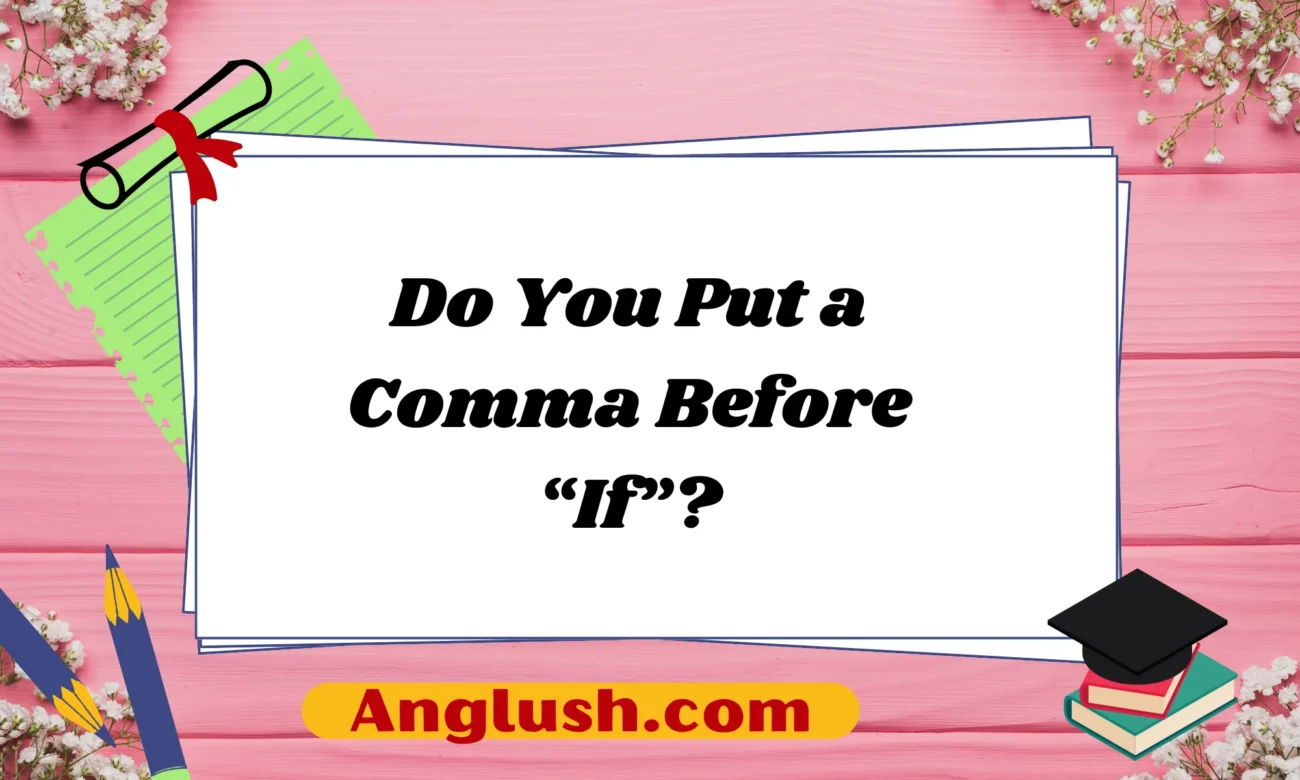Introduction
Punctuation is an essential aspect of writing, ensuring clarity and readability. One common question writers often ask is whether a comma should be placed before “if.” The answer depends on sentence structure, grammar rules, and intended meaning.
In this article, we’ll explore when a comma is necessary before “if” and when it is not. We’ll also provide examples of proper usage in different contexts, including casual and professional writing.
By the end of this guide, you’ll have a clear understanding of how to use commas correctly with “if,” improving the clarity and professionalism of your writing.
When Should You Put a Comma Before “If”?
A comma is sometimes needed before “if,” but it depends on the sentence structure. Let’s examine different scenarios where a comma is required and where it is not.
1. Using a Comma Before “If” in a Conditional Clause
A conditional clause is a statement that introduces a condition. Usually, when “if” starts a conditional clause at the end of a sentence, you do not need a comma before it.
Example:
✅ I will go to the party if I have time.
❌ I will go to the party, if I have time.
However, if the “if” clause appears at the beginning of the sentence, a comma follows the clause.
Example:
✅ If I have time, I will go to the party.
2. Using a Comma Before “If” in a Parenthetical or Nonessential Clause
A comma is necessary before “if” when it introduces a parenthetical expression or a nonessential clause that adds extra information.
Example:
✅ You should take a break, if you ask me.
Here, “if you ask me” is additional information that is not necessary to understand the sentence’s main meaning. Removing it does not change the fundamental point.
3. Using a Comma Before “If” in a Contrasting Statement
When “if” introduces a contrasting idea rather than a condition, a comma is appropriate.
Example:
✅ You need to improve your grades, if not, you might fail the course.
In this case, “if not” contrasts with the first part of the sentence, making the comma necessary.
4. Using a Comma for Emphasis
Sometimes, a comma is added before “if” for emphasis or to create a pause for better readability. This is more common in creative writing.
Example:
✅ You can always change your mind, if that’s what you want.
When Should You NOT Put a Comma Before “If”?
While a comma is sometimes needed, there are many cases where adding one is incorrect. Here are the main situations where no comma should be used.
1. If “If” Starts a Restrictive Clause
A restrictive clause is essential to the sentence’s meaning. When “if” starts such a clause, no comma should be used.
Example:
✅ She will be late if she doesn’t leave soon.
❌ She will be late, if she doesn’t leave soon.
Here, “if she doesn’t leave soon” is essential to understanding why she will be late.
2. If the Sentence Follows the Standard Conditional Format
In standard conditional sentences (where “if” introduces a cause-and-effect relationship), a comma before “if” is unnecessary.
Example:
✅ You will pass the exam if you study hard.
❌ You will pass the exam, if you study hard.
Examples of Correct and Incorrect Usage
Here’s a quick comparison of correct and incorrect usage of commas before “if”:
✅ Correct: You can succeed if you work hard.
❌ Incorrect: You can succeed, if you work hard.
✅ Correct: If you work hard, you can succeed.
❌ Incorrect: If you work hard you can succeed.
✅ Correct: That’s a good decision, if you ask me.
❌ Incorrect: That’s a good decision if you ask me.
✅ Correct: You will have fun, if not, you can leave early.
❌ Incorrect: You will have fun if not, you can leave early.
11 Texting Examples for Everyday Use
Texting often involves quick, informal communication. Here are some user-friendly examples showing how to correctly use “if” with and without commas.
- ✅ I’ll be there if I finish work on time.
- ✅ If you need anything, just text me.
- ✅ You should go, if you ask me.
- ✅ I’ll bring food if you bring drinks.
- ✅ If we leave now, we can still make it.
- ✅ You might like this, if you give it a chance.
- ✅ Let me know if you need help.
- ✅ You can call me, if you’re free later.
- ✅ If you don’t hurry, we’ll be late!
- ✅ That was a great idea, if you ask me.
- ✅ You’ll enjoy the trip if the weather stays nice.
Final Thoughts
The decision to place a comma before “if” depends on the sentence’s structure and meaning.
- No comma is needed when “if” introduces a restrictive clause or a standard conditional statement.
- A comma is required when “if” introduces a parenthetical phrase, a contrasting statement, or when used for emphasis.
Understanding these rules ensures clearer and more professional writing. Whether you’re composing a formal email, writing an academic paper, or sending a quick text, using commas correctly with “if” will enhance readability and avoid misunderstandings.

